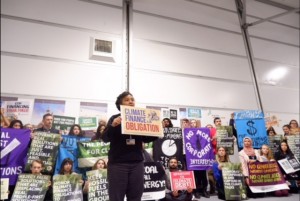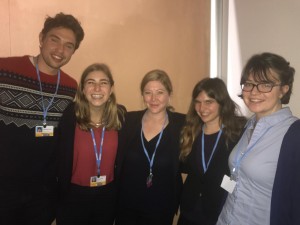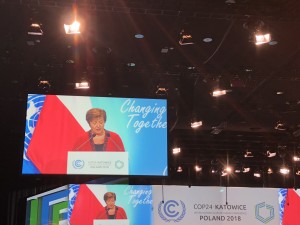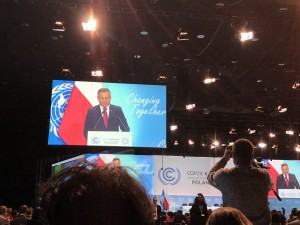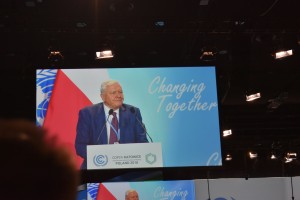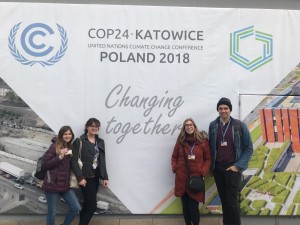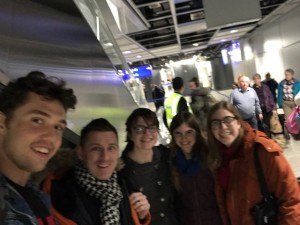Today at the COP there was a joint SBSTA IPCC special event to discuss the findings in the most recent IPCC report. The event was held in the largest plenary room at the conference, and it was filled with both conference delegates and observers. I found the event on the whole very informative, and it was clear the effort the scientists were going to to present their results in a way that would assuage the apocalyptic descriptions of the report in the popular media after its release. I really enjoyed the data although I was left with some methodological questions, which I will research after recover from sleep deprivation. I also had the opportunity to ask a question to the panel, and I have never shaken so much in my life!
Month: December 2018
People’s Demands for Climate Justice
Today was another great day and filled with lots of different experiences, including an interesting session related to climate finance that the South African delegate tried to blow-up and an informational meeting on the content of the recent IPCC report. Regarding the report, I found it very positive that a lot of delegates were affirming their commitments to meeting a new, 1.5 C target and that the take away wasn’t doom and gloom, but a reorientation of the challenge. I thought it was a very positive meeting.
The thing that was most exciting for me today is that I took place in my first protest! Ben Goloff ’15 help organize an action with the People’s Demands for Climate Justice and I went to support him. I ended up holding a sign and chanting. The Polish government is pretty strict about demonstrations, so this was inside the conference site and not out on the streets. But it still drew a crowd. I think the message of the cause is pretty important as well, so I was happy to take part. You can learn more about the movement here: https://www.peoplesdemands.org/ but the six demands are:
- Keep fossil fuels in the ground.
- Reject false solutions that are displacing real, people-first solutions to the climate crisis.
- Advance real solutions that are just, feasible, and essential.
- Honor climate finance obligations to developing countries.
- End corporate interference in and capture of the climate talks.
- Ensure developed countries honor their “Fair Shares” for largely fueling this crisis.
Inauguration of the Climate Action Hub
I did quite a few fun things today, but the one I was most excited for was the Inauguration of the Climate Action Hub, mainly because the person who impacted me most at COP-23, Hindou Oumarou Ibrahim, was speaking along with Governor Arnold Schwarzenegger. Ibrahim is an Indigenous Leader and was instrumental in the establishment of the Indigenous Peoples platform at the last COP, and I really enjoyed listening to her viewpoints. Unfortunately, this event was a lot of fan fair for Arnold and was packed, so it was hard to hear any wisdom Ibrahim had to share. The differences in view points betweenSchwarzenegger’s privileged CA life (he talked about converting his 4 hummers to electric) and Ibrahim’s work with women in Indigenous communities was stark and it seemed like the event was a bit more focused on the former. I was a bit disappointed because I think that Ibrahim has a lot to share, but I am hopeful I’ll get to hear more from her as the COP goes on.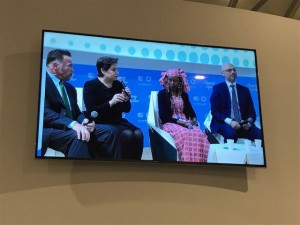
Day 1 — Meeting with U.S. Delegate & Swarthmore Professor Liz!
What an incredibly busy, bustling, and exciting first day! While most of the day was spent getting our bearings, we had the privilege of having lunch with one of the U.S.’ newest delegation members — and one of our very own — Liz Nichols. It was such a unique opportunity to hear about the conference from an insider’s perspective! Liz also shared some extremely heartening information with us regarding the U.S.’ presence at the negotiations; despite the fact that Trump has communicated his intention to withdraw the U.S. from the Paris Agreement in 2020, Liz explained how the delegates present at this COP are the same delegates who helped to craft the Paris Agreement at COP 21, and who have worked to solidify and implement this Agreement at subsequent COPs. Despite the position of the president, the U.S. delegates present at these meetings are deeply committed to taking meaningful action to combat climate change, helping to both preserve the U.S.’ reputation on the international stage and to address this urgent global crisis. Here’s to a bit of a bright spot for a more hopeful future!
— Shana
Opening Plenaries!
All of us students started out our day attending the COP24 opening ceremony, in which the Polish president, the mayor of Katowice, the leader of the World Bank, the prime minister of Fiji, and other high level officials spoke to the importance of COP24 and what it needs to accomplish. The opening plenaries made clear the main goals of COP24: to create a rule book for implementing the Paris Agreement and to ramp up climate action efforts. Many leaders cited the IPCC report as evidence that climate action efforts need to be taken seriously.
The President of the World Bank made some bold commitments in their opening speech, such as including climate change as a factor in all of their decision making, implementing a shadow price on carbon, and doubling their budget toward mitigating climate change. I was surprised that there didn’t seem to be a huge initial reaction to these commitments, so I’m hoping to hear more about them throughout the conference.
(Executive Officer of the World Bank, Kristalina Georgieva.)
The president of Poland also used the opening plenaries as an opportunity to share what Poland has been doing to combat climate change and why Katowice is a great city to host COP24. He explained how the conference center where COP24 is being held is in the same site as a shut down coal mine. Amos, Shauna, Marianne, and I debated whether or not the Polish President’s argument was convincing, as he did make a good case for how Poland has been reducing emissions. Still, many of these reductions have still come from a supposedly ‘cleaner’ coal, and many climate activists would agree that clean coal is not really possible.
The opening plenaries raised many issues I can’t wait to follow throughout the conference!
(President of Poland, Andrzej Duda.)
Inside-Out COP?
Wow! What a really interesting first day at COP! I feel like everything has just been an absolute blur and that I’ve been at the COP for way longer than I actually have been.
Like I saw David Attenborough today… How crazy is that?!?!
Anyway while seeing David Attenborough (a.k.a my second Grandfather) was definitely the highlight of my day, I also went to some very interesting meetings that gave me a lot of food for thought. In one of the side events entitled
“Climate Friendly Technologies” one of the speakers off handedly mentioned that he would prefer to see a COP structured where all the important negotiating stuff happened as side events (observers can’t attend these events anyway so what does it really matter to us?) and that people’s presentations on current work that they are doing to actively reduce carbon emissions or adapt to climate change should have more of a focus at these conferences. I thought that this one comment was actually quite profound and it got me to thinking about what a COP would be like if we focused on stuff we ARE doing instead of stuff that we SHOULD be doing. How would that change people’s perception and attitudes towards climate change? What sort of message would that send in terms of placing the importance of climate change policy on people instead of powerful governments?
At the end of the day these are rhetorical questions and I do not think that I have been able to process a comprehensive answer. But, from my first impressions of COP, it does seem like there is a definite hierarchy of events that people prioritize to attend. For example: Why were there more people at a talk from Arnold Schwarzenegger than there were at a talk about indigenous voices?
Just some food for thought for my first day at the climate negotiations. How effective is COP anyway? I guess all of us at Swat will get back to you on that sooner or later.
—Marianne
CDM as a Currency Hedge?
So the only side event I went to today was called ” Experience gained from the CDM” and in this talk I had my “market based solution” bone tickled for the first time at the conference. The biggest surprise from the talk was that the subject of the clean development mechanism, and the emissions credit market that existed in tandem with it, acted as a way of hedging currency related risks faced by green industry in developing countries. This is because many of these industries hold foreign loans, but their income is in domestic currency, so if there is a high risk premium associated with their domestic currency, paying a foreign loan may be much more difficult. The CDM, which facilitates the transfer of capital from developed to developing countries, gives these industries foreign currency, which they can use to insure they are able to pay off debts which are held in foreign currency. Hearing this discussed I found really really exciting, because I had never even thought this was a potential advantage of capital transfers between developed and developing countries.
COP 24: Day 0
Day 0:
As the COP does not start until tomorrow, the whole group got to spend the day exploring Katowice and Krakow (after we picked up our badges, of course – pictured below).
It seems like we walked through a never ending stream of Christmas Markets and just went from one place to another in search of more and more food. A lot of coffee was also drunk to stave off the jet-lag.
Can’t wait to see what is in store for us at the opening plenaries tomorrow and meet some exciting people!
